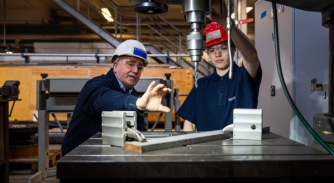The Repair Talk Shop
The Refit Advisory Group calls for a more balanced approach to refit that includes more input from captains and owners’ representatives to enhance the overall yard experience…
During 2023, when the principals of International Marine Management were designing a new refit facility in San Juan, Puerto Rico, this raised the question: what would be the ideal design and conception for a modern-day shipyard?
Rather than relying solely on their own knowledge and experience or the opinion of consultants, it was quickly decided that this exercise should be extended; by seeking the input of large-yacht captains and other end users, the facility would serve the real needs of today’s owners.
Therefore, the Refit Advisory Group was born, and although a primary objec-tive was to assist in the development and design of the Puerto Rico facility, it was quickly decided that the brief should be extended to ask more generally how refit can do better and to share the conclusions publicly.
Data was gathered using three distinct methods: in-depth and confidential interviews with captains, round-table discussions and panels, and two independent market surveys. Here, we present a brief summary of the conclusions and recommendations. A full report will be forthcoming.
Key insights
The primary drivers for yard choice vary significantly based on a vessel’s characteristics and programme. A busy charter yacht, for example, prioritises convenience of location over many other factors. Although price is important, most participants note that the real priority is value, not absolute dollars. The right choice of facility depends on the scope of works to be completed. There’s also a marked trend for yachts to complete works alongside locations outside a shipyard. Some captains say they see hauling out as increasingly risky due to past experiences and so aim to avoid haul-out wherever possible. This can lead to higher costs,
but it allows works to be completed in water.
The priorities expressed were quite consistent: having the basic technical areas handled on-site is critical. However, using contractors (and even flying them in) for more specialised tasks is not only acceptable, but also expected.
Logistics and associated costs are critical considerations for any refit works because these items can drive up costs significantly and can also create delays if not well managed.
Conclusion
There’s a disconnect between the views of refit shipyards and those of captains and owners’ representatives. However, those representing ownership are very enthusiastic about participating in meaningful dialogue about how to improve yacht refit. The current offering can significantly benefit from better representation of their perspective.
Processes such as contracts, pricing, safety protocols and reporting often appear to be structured primarily from the yard’s viewpoint. By taking a more balanced approach that includes the owner’s voice, the overall refit experience could be enhanced, leading to better outcomes and stronger relationships between all parties. In short, the Refit Advisory Group confirmed both the need for representation of the owner’s perspective in refit and the willingness of all parties to participate in the process.

Co-founders Norina Edelman (third from left, front row) and Abi McGrath (second from left, front row),
with fellow members of The Refit Advisory Group.
Recommendations
Upon review and reflection of the overall feedback received, we’ve identified six areas ripe for improvement:
1. Safety and security
Although existing safety and security records are considered a critical factor in yard choice by captains, these are not easily accessible.
Shipyards should provide a comprehensive security briefing, clearly outlining shipyard protocols, crew procedures and on-site safety measures which should also include a complete summary of do’s and don’ts for crew in the local area. It’s critical that captains and crew are given local knowledge such as flagging up any areas that should be avoided.
Making safety and security records more transparent, easily comparable and readily available will enable stake-holders to fairly consider this factor in the decision-making process. There should be a consideration to set up a standardised way of reporting safety and security through external audit or similar.
Cybersecurity and data protection is a significant concern, and stronger protection measures are essential.
The majority of captains continue to experience a marked divergence between quotes
and invoicing. Although all parties understand there may be newly discovered works,
refit yards must do better with quoting.
2. Quotations, change orders and invoicing
Invoicing has become incredibly complicated and hard to understand. Clear and simple invoicing, transparent and understandable, is critical. Consider following the yacht’s nomenclature and numbering system rather than forcing the vessel to adapt to the yard system.
Providing a detailed and accurate quote is time-consuming and requires significant investment by the yard. Consider having paid quotes on the most significant jobs to ensure that the potential client is seriously considering the yard as an option (a portion of the amount can be deducted from the eventual invoice if the vessel does come to the facility). This will give the shipyard confidence that they are not wasting their time. In turn, it will lead to better and more accurate quoting, which will generate more confidence in the market.
The majority of captains continue to experience a marked divergence between quotes and invoicing. Although all parties understand there may be newly discovered works, refit yards must do better with quoting. Exclusions, although helpful to delineate scope, have become – in the eyes of our clients – a way to obfuscate real costs. This must change.
Efficient and effective communication is key. Additional works must be priced and conveyed quickly. Any schedule changes must be communicated at the same time.
Captains and owners’ representatives are looking for increased transparency in pricing. If there’s agreement on time and materials, clients are looking for time sheets with hours clearly tracked. Consider working more on an open-book basis. There’s a clear demand for transparency and openness in pricing. If shipyards and the client could make reasonable provisions for profitability, open books may be a positive way to move forward with certain refit periods.
3. Contracts
A number of respondents currently report that a yard choice has been derailed due to contract negotiations. Some of the agreed contract templates are perceived by some owners’ representatives as having excluded the owner viewpoint. A more balanced contract structure, developed through a working group that includes owners’ representatives, yards, insurers, attorneys and other stakeholders could help to address this imbalance.
There are some areas in which responsibility is unclear; this negatively affects safety and security. Clearer delineation of all responsibilities while at a yard facility is critical not only for contractual purposes, but also to ensure that sufficient safety procedures are put in place and followed by the responsible party.
A serious commitment and investment must be made into robust training programmes
at all levels. Shipyards should collaborate and cooperate on such programmes to raise the
overall offering internationally.
4. Regulations and Class societies
Owners’ representatives expressed an interest in exploring whether there can be different relationships between refit shipyards and Class. As a build yard can be approved for a build, might there be similar ways to proceed with refit yards? Are there ways to use regulations, Class or other bodies to set standards that are measurable for more transparency? This could be for security, sustainability, aftersales and a variety of other things.
5. Crew facilities
There’s a growing focus on health and mental health for crew. A focus is on providing options to keep crew healthy and active such as fitness classes and padel courts. Having affordable housing options is a priority, and site development should generally include a plan for affordable crew/contractor housing. A focus on wellness naturally shifts the crew’s attention from less healthy activities and supports long-term health as well as crew retention.
6. Skilled labour and talent
Facilities are increasing in size and capacity at the same time that many skilled project managers and labourers are retiring because of age. Clients report experiencing a decrease in quality overall, especially in project management. Clients report not having sufficient labourers to cater to their needs and having project managers without the necessary time to devote to the vessel.
A serious commitment and investment must be made into robust training programmes at all levels. Shipyards should collaborate and cooperate on such programmes to raise the overall offering internationally.
These recommendations aim to address key challenges and, therefore, strengthen the overall refit experience for clients. This summary is just the start of the conversation. The Refit Advisory Group will continue to engage in action on these points.
This article first appeared in The Superyacht Report – Refit Focus. With our open-source policy, it is available to all for a limited period by following this link, so read and download the latest issue and any of the previous issues in our library. Look out for the New Build issue coming in February!
Profile links
International Marine Management
NEW: Sign up for SuperyachtNewsweek!
Get the latest weekly news, in-depth reports, intelligence, and strategic insights, delivered directly from The Superyacht Group's editors and market analysts.
Stay at the forefront of the superyacht industry with SuperyachtNewsweek
Click here to become part of The Superyacht Group community, and join us in our mission to make this industry accessible to all, and prosperous for the long-term. We are offering access to the superyacht industry’s most comprehensive and longstanding archive of business-critical information, as well as a comprehensive, real-time superyacht fleet database, for just £10 per month, because we are One Industry with One Mission. Sign up here.
Related news

Are refit contracts the real fit?
Giovanna Cabbia, partner at Clyde & Co, reiterates her call for negotiations between owners and yards over refits to be given the same care and attention as
Opinion
.jpg)
The Superyacht Report: Refit Focus Out Now
This release is part of our Open-Source strategy – Issue 223 will be available for free for the rest of November. Get it hot off the press!
Crew
.jpg)
IMM to lead Refit Advisory Group at MYS
IMM’s Refit Advisory Group, guided by yacht captains, aims to improve superyacht refit services, with the full report to be released in November
Crew
.jpg)
Navigating shipyard insolvency during superyacht builds
Wikborg Rein's Linda Roxburgh discusses safeguarding superyacht owners' interests if their shipyard faces financial instability mid-build
Owner

Building the next generation
Pendennis has been running an apprenticeship scheme for over 25 years, forming the bedrock of its experienced team of employees
Crew
Related news
Are refit contracts the real fit?
1 year ago
The Superyacht Report: Refit Focus Out Now
1 year ago
IMM to lead Refit Advisory Group at MYS
1 year ago
Building the next generation
1 year ago
NEW: Sign up for
SuperyachtNewsweek!
Get the latest weekly news, in-depth reports, intelligence, and strategic insights, delivered directly from The Superyacht Group's editors and market analysts.
Stay at the forefront of the superyacht industry with SuperyachtNewsweek



